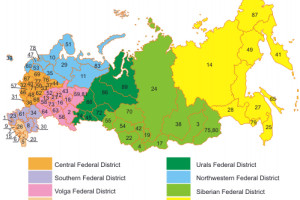Lack of Manifestos Points to Political Complacency in Russian Regions – Experts

(Moscow Times – themoscowtimes.com – Ivan Nechepurenko – September 4, 2015)
Only five acting governors taking part in elections in 21 Russian regions next week have published electoral manifestos, the Petersburg Politics think tank said in a report published Thursday.
The lack of manifestos attests to a deficit of clear vision among potential heads of Russian regions – as well as complacency that since they have already been endorsed by President Vladimir Putin, there is no need to persuade voters that they will improve their lives, regional politics and economy experts told The Moscow Times.
All the candidates seeking election were appointed as acting governors by Putin in recent months, and most were nominated and endorsed by the ruling United Russia party.
“Governors don’t need manifestos because manifestos will not get them elected, only the Kremlin’s endorsement will do that,” said Natalya Zubarevich, director of the regions program at the Independent Institute of Social Policy, a think tank in Moscow.
“They don’t have a vision of the future of their regions, and furthermore, the federal government and society at large also lack this vision – there is only a desire to cling on to the status quo,” Zubarevich said in a phone interview.
The manifestos that have been published are mostly weak, concentrating on previous achievements and promising stability instead of development, the Petersburg Politics think tank found.
“Some of the manifestos are written in such a way as though the candidates have already won the elections,” the report said.
While some of the acting governors have been running their regions for years, others were appointed by the Kremlin just a few months before the elections.
One such governor, Veniamin Kondratyev, acting head of the Krasnodar region – one of the most prosperous in Russia – had not responded to a request for comment by the time of publication.
Another, the acting head of the Tambov region Alexander Nikitin, does in fact have a manifesto, it emerged, but it proved impossible to find without the help of his representatives.
“As far as I know he has a manifesto,” Vladimir Shunyayev, a spokesman for the Tambov regional administration, told The Moscow Times in a phone interview without elaborating.
Olga Chepurnova, a spokeswoman for the local branch of the United Russia party, said that the manifesto exists and is published on the branch’s website. But extensive trawls of the site yielded no results until Chepurnova sent a direct link to it.
In the Kostroma region, gubernatorial aide Alexander Fisher told a regional television station in August that acting governor Sergei Sitnikov is busy with the everyday work of getting schools ready for the winter heating season, and therefore will not have time to campaign.
“The region’s residents know Sitnikov’s manifesto, it is being implemented every day and its results are evident,” said Fisher.
In the Kaluga region, a candidate from the Cossack party, Yury Zhukov, said he was withdrawing from the campaign after finding out that his manifesto was very similar to that of the acting governor Anatoly Artamonov. Aside from the question of why a rival would be granted an advance peek at another candidate’s manifesto, Artamonov’s program is not in fact finished and has not yet been published, he told The Moscow Times in a phone interview.
“We have a development strategy for the Kaluga region through 2030 and I will also prepare my own manifesto on the basis of local residents’ ideas that I am collecting until the end of this week,” said Artamonov.
According to Alexander Kynev, a political scientist whose research is concentrated on regional elections, governor manifestos were formerly generally oriented at local elites rather than at average voters.
“The heads of local businesses and enterprises want to know what will happen with local policies and projects, so for them it was important to read a manifesto,” Kynev said in a phone interview.
“Today the problem is that there is no real competition. If we had rivalry among candidates, they would have competing manifestos,” he said.
Russia reintroduced direct regional gubernatorial elections in 2012 after Putin abolished them in 2004, citing the need to consolidate the country in the face of a terrorism threat. Nevertheless, regional elections remain a formality, the Petersburg Politics think tank said in the report.
Gleb Kuznetsov, a Moscow-based political commentator, said that the gradual disappearance of electoral manifestos is a natural trend in a situation when people rely on the Internet and no longer want to read long and mundane texts.
“For 10 years these programs were drafted mostly as a ritual – every candidate had to have a decent suit and a manifesto,” Kuznetsov said in a phone interview.
“Today the economy is in crisis, so there is no need to waste time and resources on this useless atavism,” he said.
